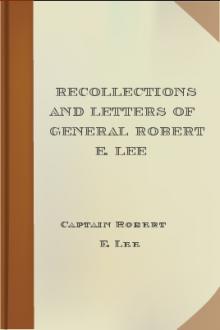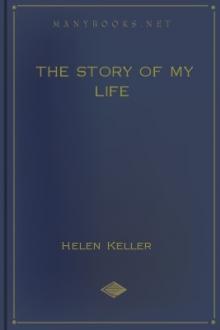Recollections and Letters of General Robert E. Lee by Captain Robert E. Lee (howl and other poems .txt) 📕

- Author: Captain Robert E. Lee
- Performer: -
Book online «Recollections and Letters of General Robert E. Lee by Captain Robert E. Lee (howl and other poems .txt) 📕». Author Captain Robert E. Lee
Ohio Railroad), from seven to eleven. On one occasion, a gentleman during his first visit to Lexington called on General Lee and on bidding him good-bye asked him the best way to get back to Washington.
“It makes but little difference,” replied the General, “for whichever route you select, you will wish you had taken the other.”
It was, therefore, the desire of all interested in the welfare of the two institutions of learning located in Lexington that this road should be built. My father’s previous habits of life, his nature and his tastes made him averse to engaging in affairs of this character; but because of the great advantage tot he college, should it be carried through, and a the earnest request of many friends of his and of the road, he consented to act. General John Echols, from Staunton, Colonel Pendleton, from Buchanan, Judge McLaughlin, from Lexington, were amongst those who went with him. While in Baltimore he stayed at the house of Mr. and Mrs. Samuel Tagart, whom he had met several summers at the White Sulphur Springs.
The delegation was invited to the floor of the Corn and Flour Exchange, to meet the business men of the city. My father, for the same reasons given above, earnestly desired to be excused from this part of the programme, and asked some of his friends to see Mr. John W. Garrett, the president of the Baltimore & Ohio Railroad, who had the delegation in charge, and try to have it so arranged. Mr. Garrett, however, was very positive.
“General Lee is a most interesting man; I think he had better come,”
was the message brought back to him.
As he appeared on the floor, which was filled with a great crowd, he was greeted with deafening cheers, and was soon surrounded by the thousands who had assembled there to see him. Everywhere that he appeared in the city he received an ovation. Sunday intervening, he attended services in the morning at St. Paul’s church on Charles Street. When it became known that General Lee was there, large numbers collected to see him come out, waiting patiently and quietly until the congregation was dismissed. As he appeared at the door, all heads were uncovered and kept so until he had passed through the long lines extending down the street.
A reception was given by Mr. Tagart in his honour. There his friends crowded to see him, and the greatest affection and deference were shown him. He had lived in Baltimore about twenty years before this time, and many of his old friends were still there; besides, Baltimore had sent to the Army of Northern Virginia a large body of her noble sons, who were only too glad to greet once more their former commander.
That he was still “a prisoner on parole,” disfranchised from all civil rights, made their love for him stronger and their welcome the more hearty. On his return to Lexington, he was asked how he enjoyed his visit. With a sad smile, he said: “Very much; but they would make too much fuss over the old rebel.”
A few days after he came home, when one of his daughters remonstrated with him about the hat he was wearing, he replied: “You don’t like this hat? Why, I have seen a whole cityful come out to admire it!”
There is only a short note to my mother that I can find written during this trip:
“Baltimore, April 27, 1869.
“My Dear Mary: I am still at Mr. Tagart’s, but propose going to-morrow to Ella’s, and thence to Washington’s, which will consume Wednesday and Thursday. If not obliged to return here, which I cannot tell till this evening or to-morrow morning, I will then go to Washington, where I shall be obliged to spend a day or two, and thence to Alexandria, so I shall not be able to return to Lexington till the last of next week. What has become of little Agnes? I have seen many of our old friends, of whom I will tell you on my return.
I have bought you a little carriage, the best I could find, which I hope will enable you to take some pleasant rides. All send love.
Give mine to Mildred, and Custis, and all friends. I am just about starting to Mrs. Baker’s.
“Truly and affectionately, R. E. Lee.
“Mrs. M. C. Lee.”
The “Ella” mentioned was Mrs. Sam George, of Baltimore, who as a girl had always been a pet and favourite of my father. She was a daughter of his first cousin, Mr. Charles Henry Carter, of “Goodwood,”
Prince George County, Maryland, and a schoolmate of my sister Mary.
Their country place was near Ellicott City. He went there to see her, and from there to “Lynwood,” near by, the seat of Washington Peter, my mother’s first cousin and an intimate friend of us all On Saturday, my father, accompanied by Mr. and Mrs. Tagart, went to Washington on an early train. They drove immediately to the Executive Mansion and called on the President. This meeting was of no political significance whatever, but simply a call of courtesy. It had been intimated to General Lee that it would be most agreeable to General Grant to receive him. Mr. and Mrs. Tagart went with him, and they met there Mr. Motley, the newly appointed Minister of England. The interview lasted about fifteen minutes, and neither General Lee nor the President spoke a word on political matters. While in Washington my father was the guest of Mrs. Kennon, of Tudor Place, Georgetown Heights. On Sunday he dined with Mrs. Podestad and her husband, the Secretary of the Spanish Legation, who were old friends and relatives.
After leaving Washington, he stopped in Alexandria for several days, as the guest of Mrs. A. M. Fitzhugh. It was at her country place, “Ravensworth,” about ten miles from town, that his mother had died, and there, in the old ivy-covered graveyard, she was buried. Mrs.
Fitzhugh was the wife of my mother’s uncle, Mr. William Henry Fitzhugh, who, having no children, had made my mother his heir. The intimacy between “Arlington” and “Ravensworth” was very close. Since Mr.
Fitzhugh’s death, which occurred some thirty years prior to this time, my father and mother and their children had been thrown a great deal with his widow, and “Aunt Maria,” as we called her, became almost a member of the family. She had the greatest love and admiration for “Robert,” sought his advice in the management of her estate, and trusted him implicitly. His brother, Admiral Sidney Smith lee, came up from “Richland,” his home on the Potomac near Acquia Creek, to meet him, and he found at Mrs. Fitzhugh’s “Aunt Nannie” [Mrs. S. S. Lee] and her son Fitz. Lee. This was the first time they had met each other since their parting in Richmond just after the war.
On his arrival in Alexandria my father had walked up from the wharf to “Aunt Maria’s.” He was recognised by a number of citizens, who showed him the greatest deference and respect. So many of his friends called upon him at Mrs. Fitzhugh’s that it was arranged to have a reception for him at the Mansion House. For three hours a constant stream of visitors poured into the parlours. The reception was the greatest ovation that any individual had received from the people of Alexandria since the days of Washington. The next day, in Bishop Johns’ carriage, he drove out to Seminary Hill to the home of Mr.
Cassius F. Lee, his first cousin, where he spent the night. In the afternoon he went to see the bishop and his family—General Cooper and the Reverend Dr. Packard. The next morning, with Uncle Smith, he attended Ascension-Day services at Christ church, and was afterward entertained at a dinner-party given by Mr. John B. Daingerfield.
Before he left Alexandria he called on Mr. John Janney, who was president of the Virginia Convention in 1861, when, as Colonel Lee, he appeared before it and accepted the command of the Virginia forces, organised and to be organised.
One evening a correspondent of the New York “Herald” paid him a visit for the purpose of securing an interview. The General was courteous and polite, but very firm. He stood during the interview, and finally dismissed the reporter, saying:
“I shall be glad to see you as a friend, but request that the visit may not be made in your professional capacity.”
The same correspondent had tried to interview him, for his paper, while he was in Baltimore, but had failed.
My father was much amused at an occurance that took place during this visit. Late one afternoon a visitor was announced. As the General was very tired, Uncle Smith Lee volunteered to relieve him. The visitor was found to be an Irishwoman, very stout and unprepossessing, who asked if she could see the General. The Admiral bowed, intimating that he was the desired person, when she said: “My boy was with you in the war, honey, and I must kiss you for his sake.” And with that she gave the Admiral an embrace and a kiss.
Mr. Cassius Lee, to whom he told this, suggested that he should take General Fitz. Lee along to put forward in such emergencies.
My father’s first letter after his return to Lexington was the following:
“Lexington, Virginia, May 11, 1869.
“My Dear Fitzhugh: I reached here last Saturday, bringing Agnes and Miss Peyton with me from Staunton. Found everybody well and Custis better. I had, upon, the whole, a pleasant visit, and was particularly glad to see again our old friends and neighbours in Alexandria and vicinity; though should have preferred to enjoy their company in a more quiet way. Your Uncle Smith came up to meet me, and your Aunt Nannie and Fitz. were there. I had not seen them since I parted from them in Richmond after the war. I wish I could have visited you and Rob and have seen my daughter and grandson; but that pleasure, I trust, is preserved for a future day. How is the little fellow?
I was much relieved after parting from you to hear from the doctors that it was the best time for him to have the whooping-cough, in which opinion the ‘Mim’ concurs. I hope that he is doing well. Bishop Whittle will be here Friday next and is invited to stay with us.
There are to be a great many preparatory religious exercises this week. A great feeling of religion pervades the young in the community, especially at the Virginia Military Institute. All send love.
“Your affectionate father,
“R. E. Lee.”
Since his establishment in Lexington, General Lee had been a member of the vestry of Grace (Episcopal) church. At the council of 1868, which met at Lynchburg, he had been sent as a delegate, and spent three days there. This year the council was to meet in Fredericksburg, and he was again elected to represent his church. This was a busy time with him. The examinations were commencing, his





Comments (0)